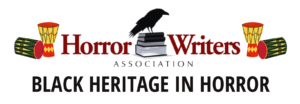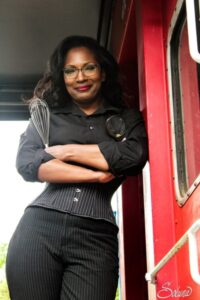Black Heritage in Horror: An Interview with Nikki Woolfolk

A latchkey kid of film noir, cozy mysteries, and gritty detective novels, Nikki Woolfolk writes humorous mysteries with a bite.
What inspired you to start writing?

I wanted to travel the world, but my family didn’t travel during my childhood besides occasional visits to grandparents. So, I created stories as a means to research places I wanted to visit and all it cost me was paper, pencils, and a library card.
I needed to write about my grief of a loss that happened when I was kid. I wrote horror, a revenge piece that allowed me to speak loudly about topics that people whisper on their lips. The villains and irritating people in my stories are metaphors for certain problematic character traits.
What was it about the horror genre that drew you to it?
I am continuously amazed at horror writer’s skills to scare me, creep me out, and get me to think. I am the first to tell you that I don’t read or watch horror only to realize many shows and books I’ve read were horror fantasy. In the past I had this narrow view of what constituted horror because I didn’t realize I was watching subgenres of it that were laced with speculative fiction.
Do you make a conscious effort to include African diaspora characters and themes in your writing and if so, what do you want to portray?
Years ago I wanted to be an author in traditional publishing, but I figured I never would unless I made sure my characters weren’t Black. As I’ve engaged and interacted with traditional and indie published authors I shrugged off the reality of traditional publishing’s non-melanin requirements and started to create my stories with people that looked like me.
Also, the constant in my stories is the theme of found family is woven into every story I create and being able to read stories that make sure we are front and center of the story is needed. Seeing ourselves experiencing the world through the genre lens of horror and its offshoots has been uplifting to see in the writing world.
What has writing horror taught you about the world and yourself?
Horror is not one size fits all. In fact I realized it was a genre that allowed me to connect with others in terms of the storytelling, the themes, and the commentary that horror brings with it as a reflection of the time.
Writing horror allows me to shed the coat of doubt, anxiety, and fear. I have a voice and I can speak on universal experiences that are rough and ugly while lacing the story with hope. Hope for something better than the horrors that await the characters.
How have you seen the horror genre change over the years? And how do you think it will continue to evolve? / Who are some African diaspora horror authors you recommend our audience check out?
I’ve noted in the indie publishing world horror within the African diaspora community has taken off and names like Nicole Givens Kurtz, Lynda Davis, Sumiko Saulson, Milton Davis are familiar in the book world.
There are subgenres that have allowed horror to take shape that slides in-between gore, revenge, psychological, physical, and environmental horrors to be explored. Because Black folx are creating content and publishing within our community for us, by us, I believe we are evolving.
How do you feel the Black community has been represented thus far in the genre and what hopes do you have for representation in the genre going forward?
Before we sought out representation and took whatever scraps were given, but now we’ve decided to create our own work. We write for ourselves and those that are directly looking to read our stories. The level of racial gatekeeping is lowered in indie publishing and has allowed many folx to find support in the community without begging and pleading for a seat at a table that may not provide a meal of substance for ourselves.
Who are some of your favorite Black characters in horror?
I don’t have a favorite as of late, but I’ve been curious to see Horror Noire: A History of Black Horror. As a kid I was frightened by horror, but would watch behind fingers covering my face with my mom. It would be wonderful to walk down memory lane and see just what terrified me back then.
What is one piece of advice you would give horror authors today?
Unravel your doubts and make an effort to throw yourself in writing your story and do this by discovering what styles, tips, and craft tricks work best for you.
And to the Black writers out there who are just getting started, what advice would you give them?
All those ideas you’ve got in your mind need to be written down if only to write a sentence or two about each stores premise. This is a great habit to practice and to encourage you to type it up as a document to stay organized and add to the list whenever thoughts pop up. Also, keep a folder containing a list of digital and print references, resources, and authors you have engage with during events.
These will help you when you attend events, are looking for insight into seller at a particular book store and have an author friend in the area that may be able to give advice. Speaking of advice, writing advice is often about the craft, but not the preparation to allow for creative flow that is not stalled due to disorganization.
Also note how fellow writers around you offer solicited advice and people that are honest about the feedback from your work and not criticizing you as a person. Make sure to not tear yourself down when fixing and editing your work.



